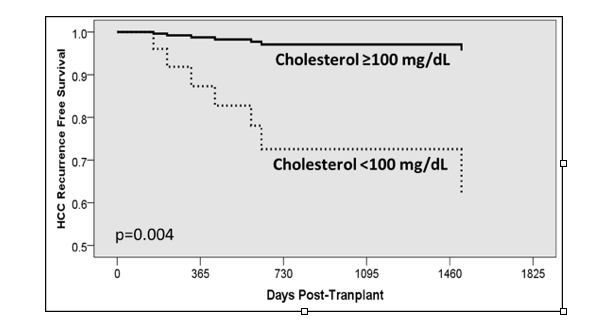E. D. Colhoun1, C. G. Forsberg1, K. D. Chavin1, P. Baliga1, D. Taber1 1Medical University Of South Carolina,Charleston, Sc, USA
Introduction: Hepatocellular Carcinoma (HCC) rates have doubled over the past two decades, becoming the sixth most common cancer and the third most lethal cancer worldwide. Orthotopic liver transplant (OLT) is now the gold standard for treating HCC, although recurrence rates of HCC after OLT still remain an obstacle.
Methods: We performed a single-center retrospective longitudinal cohort study with the aim of determining the predominant baseline and follow-up variables that are significantly associated with HCC recurrence. We gathered pre and post transplant data and conducted univariant and multivariant analysis to assess variables predicting HCC recurrence after OLT.
Results: Between 2003 and 2015, 141 patients underwent OLT for HCC at our institution. We identified 9 cases of documented HCC recurrence (6.4% of patients). Univariant analysis indicated that the mean serum alphafetoprotein (AFP) difference (maximum pretransplant value minus most recent prior to transplant value) was significantly lower in the HCC recurrence group (157.7 vs 0.64; p=0.018), as well as the mean maximum pre-transplant cholesterol (162.9 vs 119.3; p=0.038), and mean days between HCC treatment initiation and transplantation (146.9 vs. 37.9; p=0.025). Maximum tumor size was larger in the HCC recurrence group (3.1 vs. 2.2 cm; p=0.14) as well. Multivariant analysis revealed that only pre-transplant mean maximum serum cholesterol levels were independently associated with HCC recurrence free survival (HR 11.0, p=0.004, see Figure 1).
Conclusion: The risk of HCC recurrence following OLT was quite low in this cohort of patients, which may be a reflection of low baseline risk or lack of reporting. Based on univariate and multivariant analysis, pre-transplant cholesterol was the strongest predictor of recurrence and may help clinicians risk-stratify patients for appropriate post-transplant monitoring and follow-up.
